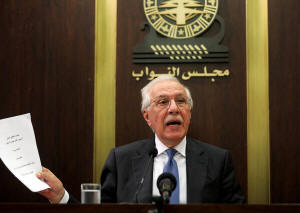|
Judge Fadi Sawan charged three former ministers and the
caretaker prime minister last week, sparking a fierce debate
about whether the judge had the authority to charge the
politicians in a nation still seeking answers about the blast.
The explosion added further strains to a country struggling with
its worst crisis since the 1975-1990 civil war.
Some leading parties rebuked the judge for his action, including
Shi'ite Muslim movement Hezbollah and the Sunni group led by
former Prime Minister Saad al-Hariri.
Ali Hassan Khalil, a former finance minister, and Ghazi Zeaiter,
a former public works minister, who were both charged, said they
had not been officially informed of Wednesday's session, which
protocol demanded.
Both are lawmakers from Amal, the Shi'ite party led by powerful
Parliament Speaker Nabih Berri who is allied to Hezbollah.
Sawan could not immediately be reached for comment.
Hassan Diab, the caretaker prime minister whose cabinet resigned
after the explosion, declined to be questioned on Monday. An
official source said the judge set a new appointment for Friday
but had yet to receive a response. Diab says his conscience is
clear over the matter.
Families of blast victims are increasingly frustrated that
details have not emerged from an investigation since the Aug. 4
explosion caused by a huge stockpile of ammonium nitrate, which
was stored in unsafe conditions.
The blast, one of the biggest non-nuclear explosions in history,
injured thousands of people and devastated several districts in
the centre of the capital.
Many Lebanese say they have given up hope of finding out the
truth about the explosion in a country where a political elite
have held power for decades amid corruption and mismanagement,
while few in authority have ever been held to account.
Politicians say Sawan has been selective and overstepped his
powers, while the head of the Beirut Bar Association and others
say the judge has shown courage.
Khalil said he played no role in the blast case. The Finance
Ministry, which he led from 2014 to early 2020, oversees
customs.
Zeaiter, who called the charges "a blatant violation", ran the
Public Works Ministry in 2014, soon after ship carrying the
ammonium nitrate arrived at the port.
(Reporting by Ellen Francis; Editing by Edmund Blair)
[© 2020 Thomson Reuters. All rights
reserved.] Copyright 2020 Reuters. All rights reserved. This material may not be published,
broadcast, rewritten or redistributed.
Thompson Reuters is solely responsible for this content.

|
|






